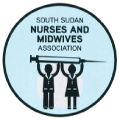History of the South Sudan Nurses & Midwives Association (SSNAMA)
2005
Peace Agreement Established
Enormous challenges ahead
Following the Peace Agreement, the Government of Southern Sudan is established. However, after decades of conflict, health resources are depleted:
-
Maternal deaths reach 2,000 per 100,000 — the highest in the world.
-
Only 4,600 health personnel in Southern Sudan.
-
Only 10-20% of staff have more than 9 months of training.
-
More than 2/3 of healthcare personnel are in three states, with higher concentration in urban areas like Juba.
Southern Sudan requests assistance from outside countries.
We have to learn from experiences… We are not ashamed about our situation. Our people must access a better heathcare system.
— Dr Olivia Lomoro, Acting Under Secretary
2006
Attempting to Save Mothers
Community Midwives
-
A cohort of Community Midwives are trained for 18 months to support SBAs (Skilled Birth Attendants), to try to meet the enormous challenges of supporting so many mothers in crisis.
2007
First Graduating Cohort Face Big Challenges
96 students graduate as Community Midwives
-
Many of them do not have the necessary practical experience.
-
Rather than be deployed to the communities, many graduates are brought into hospitals due to enormous shortages.
2009

Investing in Midwives
Country launch of the UNFPA/ICM Global Programme
-
United Nations Population Fund (UNFPA) supports the Ministry of Health (MOH) to launch the global programme Investing in Midwives, which is implemented in over 30 countries around the world in collaboration with the International Confederation of Midwives (ICM).
-
In Southern Sudan, this programme is launched under the distinct pleasure of the Vice President.
2010
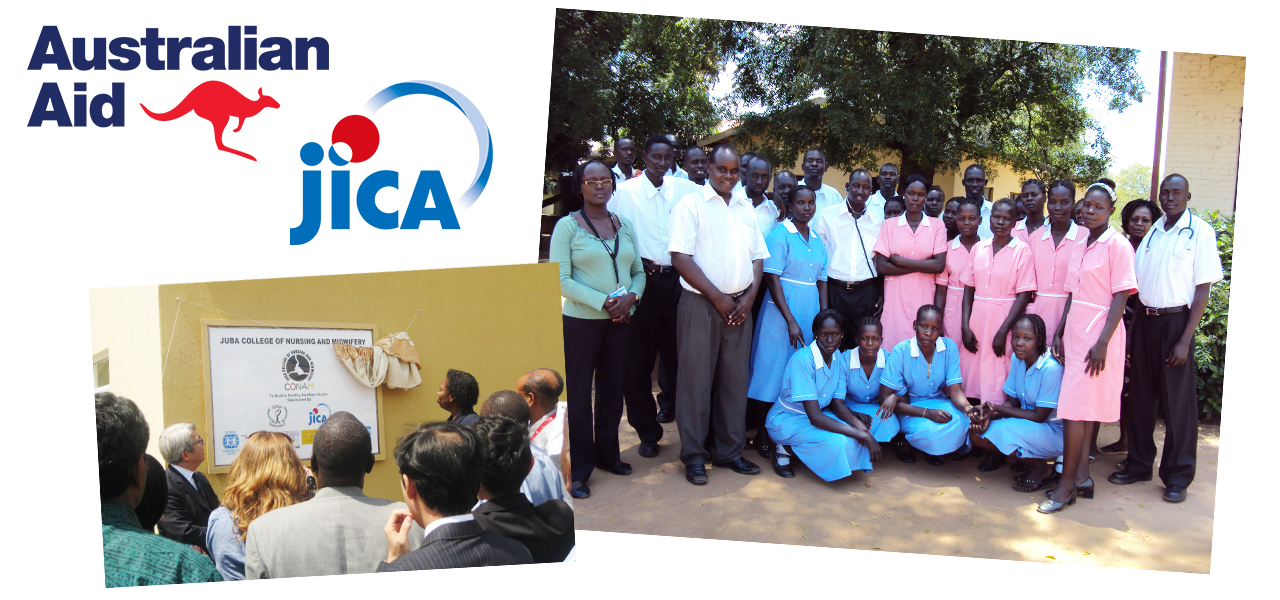
Training Nurses and Midwives is a Priority
Southern Sudan National Health Facility Mapping Estimates
The situation is slowly improving, but estimates indicate that deployed within the healthcare system, there are only:
-
83 registered nurses
-
1,110 certified nurses
-
19 Registered Midwives
-
132 Community Certified Midwives (CMW)
Absence of regulations and a Nurses and Midwives Act
-
Contributes to the lack of knowledge regarding their scope of practice.
-
Inability to guarantee quality nursing and midwifery care to the general population.
-
No formal mechanism in place for the continuous professional development of midwives and nurses.
-
No association to support regulation.
-
Some nurses are called up to be midwives.
Deployment of international midwifery specialists
-
As a result of the many gaps and low status of midwifery in the country and the high maternal mortality ratio, UNFPA, as part of the global programme on investing in midwifery, deploys two international midwifery specialists in Southern Sudan.
-
With support from Australian AID, UNFPA also deploys the first international United Nations Volunteer (UNV) midwife at the Juba Teaching Hospital to support midwifery services.
Task force to create a midwifery and nursing association
-
A small cohort of nurses and midwives come together to create an association of nurses and midwives in South Sudan.
-
They develop a concept note and a plan for establishing a national association with state branches.
On the task force:
-
Gillian Butts-Garnett, Midwifery Specialist with UNFPA
-
Rev. Janet Michael, Director General of Nursing and Midwifery
-
Victoria Abua, Deputy Director In-service Training
-
Susan Poni, Deputy Director Nursing
-
Mary Rose, Director of Midwifery (MOH)
-
Anita Peter, Matron, Juba Teaching Hospital
Midwifery training
-
A further 110 Community Midwives are trained at health training institutes in the country.
Juba College of Nursing and Midwifery (JOCNAM)
-
The dormitory for student accommodation is built with support from the Japan International Cooperation Agency (JICA) and UNDP.
-
18 nursing and 12 midwife trainees are registered — of these, 10 are male and 20 are female.
-
Trainees come from Eastern Equatoria, Central Equatoria, Upper Nile and Western Equatoria states. The school is supposed to take students from all states, but it is difficult to get candidates with all entry requirements.
-
The highly motivated and enthusiastic students start by taking foundation courses in mathematics, biology and English.
-
The school helps contribute towards the achievement of the Millennium Development Goal 5 (reduction of maternal mortality), as well as improving access to family planning, and basic and comprehensive emergency and obstetric care.
-
When they have finished training in 2013, the qualified nurses and midwives will repatriate to their respective states to offer professional support to the health facilities.
-
Petronella Wawa is identified as the principal of JCONAM.
Some of us have been working as nurses in various state hospitals. We are very happy to be here. The courses will help us upgrade our knowledge and skills.
— Midwifery student
First Diploma College of Midwifery and Nursing
-
The first college of this kind in the country is established with support from the UNFPA, Real Medicine Foundation, St. Mary’s Juba, and St. Mary’s Isle of Wight.
-
UNFPA receives funding from the Maternal and Newborn Health Thematic Fund and Australian AID.
-
Eventually, the management of the school is handed over to the Ministry of Health (MOH).
2011
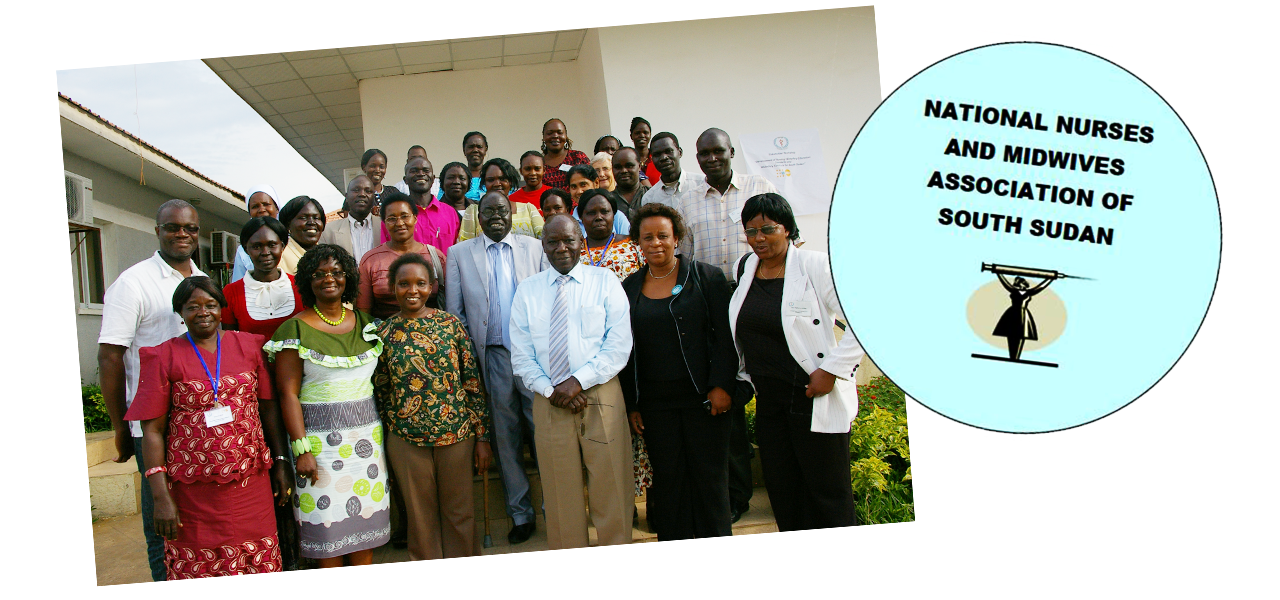
National Association of Nurses and Midwives of Southern Sudan (NAMASS) is Born
International Day of the Midwife March
-
On May 5, International Day of the Midwife, there is a major march through the streets of Juba celebrating nursing and midwifery, and ending with a rally for maternal health at Juba College of Nursing and Midwifery.
Inaugural Meeting
NAMASS is launched by the Under Secretary, and at the first meeting an interim executive is elected:
-
Jemelia Beda, President
-
Polly Grace, Vice President
-
Repent Khamis, Secretary
-
Michael Malish, Treasurer
-
Petronella Wawa, Midwifery Chapter Chairperson & Vice President
-
four Committee members
A draft of the Midwifery and Nursing Association Constitution is created.
State Chapters
-
Team from UNFPA and MOH, and NAMASS executives visit all ten states in South Sudan to hold meetings, to discuss and educate about the importance of the association, and to establish State Chapters (branches).
-
A State Chapter Handbook is created. It serves as a guide for midwives and nurses to better understand the benefits of an association and their role.
-
UNFPA and MOH issue a supplementary on strengthening nursing and midwifery in the South Sudan Medical Journal.
South Sudanese Independence
-
The successful outcome of the referendum results in Southern Sudan celebrating its independence in July 2011, becoming the Republic of South Sudan.
Steps towards regulation and strengthening the professions
-
The first national workshop to finalize the diploma in midwifery curriculum is held with participants from ICM and representatives from training institutes in neighbouring countries. The midwifery curriculum is validated and approved for use.
-
UNFPA first procures and distributes midwifery education equipment and simulators to four health training centres in states across the country, and establishes a modern state of the art library and skills lab at the Juba College of Nursing and Midwifery.
-
The Nursing and Midwifery Technical Working Group is established as an advisory committee to the Director General for Nursing and Midwifery.
-
The first stakeholders workshop on nursing and midwifery regulations is held with midwives and nurses from across South Sudan, including representatives from ICM, ECSACON, and councils from Uganda and Kenya. A road map is developed for establishing nursing and midwifery regulations in the country, and a task force is established to review the draft Bill developed by a UNFPA midwifery specialist.
-
23 students are granted scholarships to pursue studies for a certificate in midwifery in Uganda, as a collaborative effort between the Ministries of Health of South Sudan and Uganda. Interviewers from training institutes in Uganda arrive in South Sudan with support from UNFPA, and 44 students are selected out of 128 interviewed for scholarships.
-
17 additional international United Nations Volunteer (UNV) midwives are deployed across all the ten states of the country. These midwives work to support midwifery service delivery, strengthen state associations, and provide mentoring to students on the clinical areas.
-
There is a Ministerial Order to stop all training of traditional birth attendants, community midwives, village midwives, and maternal and child health workers. Only enrolled Certificate (2.5 years) and Diploma (3 years) Midwives will be trained.
DOCUMENTS ...
2012
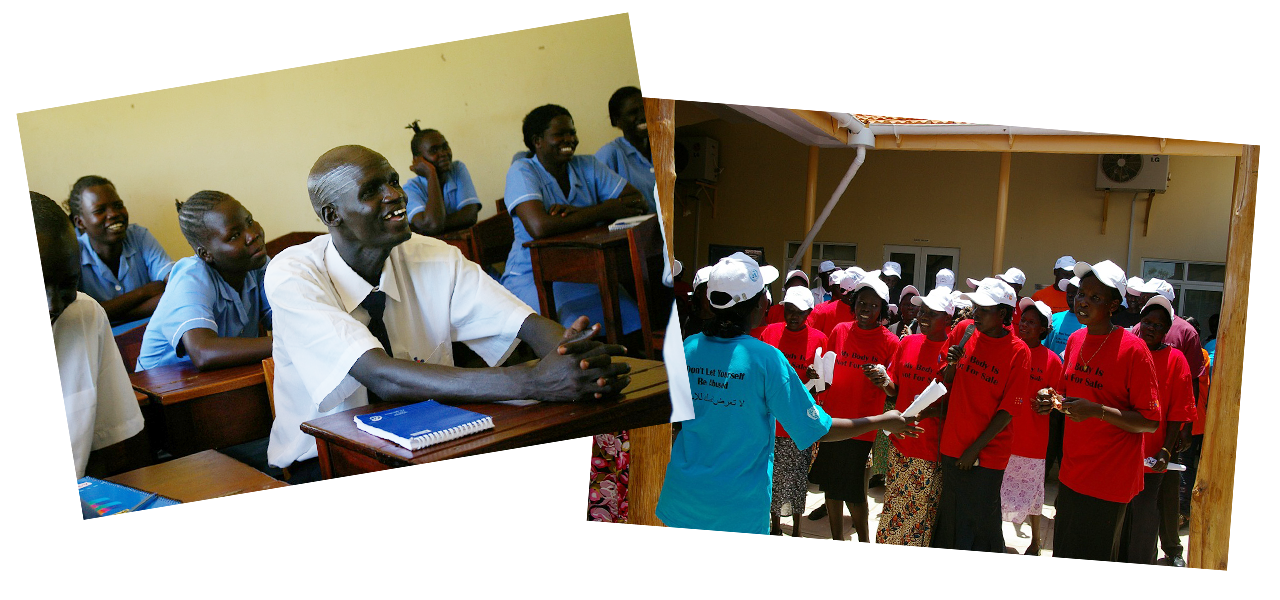
Steps to Legitimacy
NAMASS Membership
-
National Association of Nurses and Midwives of Southern Sudan (NAMASS) membership form is created and membership fees are established.
-
Active registration of the association members begins.
-
Board meetings of the interim executive are held in Juba twice a year at the UNFPA conference hall.
-
A major workshop for all board members is held to sensitize them to their roles and responsibilities.
-
Efforts are made to also include nurses and midwives in the South Sudan Medical Council, but this is later put on hold.
-
United Nations Volunteer (UNV) midwives continue to be deployed in the country, with support from UNFPA core resources after the project funded by Australian AID ends.
Strengthening Midwifery Services in South Sudan, Phase 1
-
UNFPA receives support from Canada for funding of the Strengthening Midwifery Services project for 4 years, starting April 2012. The project focuses on strengthening all pillars of midwifery — Education, Regulation and Association Strengthening — as well as task shifting initiatives and training of other health workers, such as obstetricians.
-
Midwifery curriculum is finalized, and UNFPA supports training midwives at the certificate level (2.5 years) at Kajo Keji and Wau. The Wau Midwifery School is established, and the midwifery training programme at Kajo Keji includes upgrading community midwives to enrolled midwives. Another diploma midwifery course is started at Maridi HIS.
-
UNFPA offers scholarships for midwives at the Catholic Health Training Institute in Wau (a faith‑based training institute). Eighteen students receive scholarships.
-
UNFPA supports 12 nurses, midwives, and clinical officers to be trained in Tanzania as tutors. They are deployed to health sciences institutes on their return.
-
International Day of the Midwife (IDM) is celebrated with a march and rally, with main events in Juba and Torit.
DOCUMENTS ...
2013
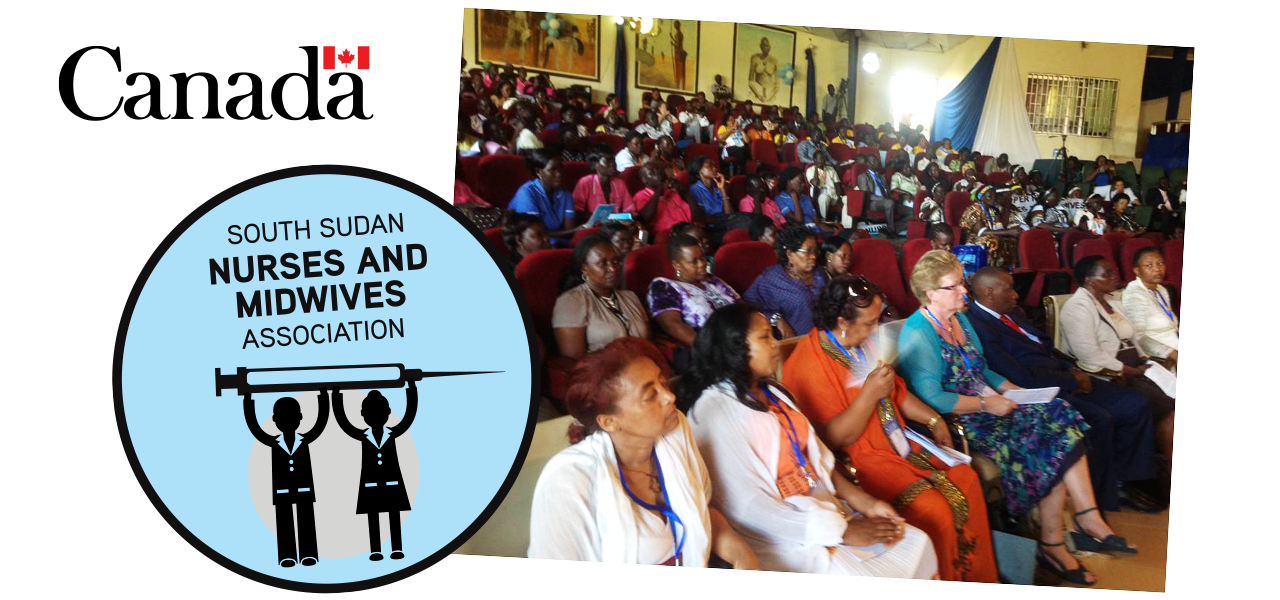
South Sudan Nurses and Midwives Association (SSNAMA) is Born
SSNAMA is officially registered
-
The term “national” is removed, as there were objections, and “SSNAMA” is formalized by its executive. Its first bank account is established.
-
SSNAMA joins the East, Central and Southern Africa College of Nursing (ECSACON), and receives conditional membership of the International Confederation of Midwives (ICM).
-
First SSNAMA conference is held with over 500 participants from across the country, including representatives from all state branches. In attendance are the Vice President of the International Confederation of Nurses (ICN), board members from the ICM, the president of ECSACON, and presidents from associations in Kenya, Uganda and Ethiopia. Key presentations from neighbouring associations focus on how to strengthen advocacy, and include profiles of nursing and midwifery.
-
SSNAMA holds its first communications workshop for public relations officers from all state branches, and drafts an advocacy and communications strategy.
-
UNFPA supports a workshop for journalists on promoting nursing and midwifery through the media.
Education
-
First national examinations for nursing and midwifery commence, after the revitalization of the National Examinations Board.
-
First group of students in Midwifery and Nursing graduate from JCONAM and receive their diplomas.
Regulation and association strengthening
-
Canada begins funding the deploying midwives project through UNFPA. 30 international United Nations Volunteer (UNV) midwives are deployed throughout the country in all 10 states, to strengthen midwifery service delivery and mentor students at training institutes.
-
UNFPA supports a consultant to develop the first Nursing and Midwifery Strategic Plan for South Sudan. The draft Strategic Plan focuses on nursing and midwifery regulations, education, association, and leadership.
-
UNFPA supports a gender assessment of the midwifery programme. The assessment reveals that there is a need for integration of gender issues in all pillars of midwifery, including midwifery education, midwifery policy, association, and regulatory documentation.
-
First Emergency Obstetric and Newborn Care (EmONC) Needs Assessment is conducted in South Sudan with support from Canada. This is a joint programme with UNICEF and WHO. This EmONC Needs Assessment is widely supported by SSNAMA’s state chapters across the country. Many of the association members are engaged in data collection and analysis.
-
WHO commences deploying international and national midwives at health facilities, as part of their sexual and reproductive health project.
Conflict erupts in South Sudan
-
Civil war breaks out in December 2013.
DOCUMENTS ...
2014
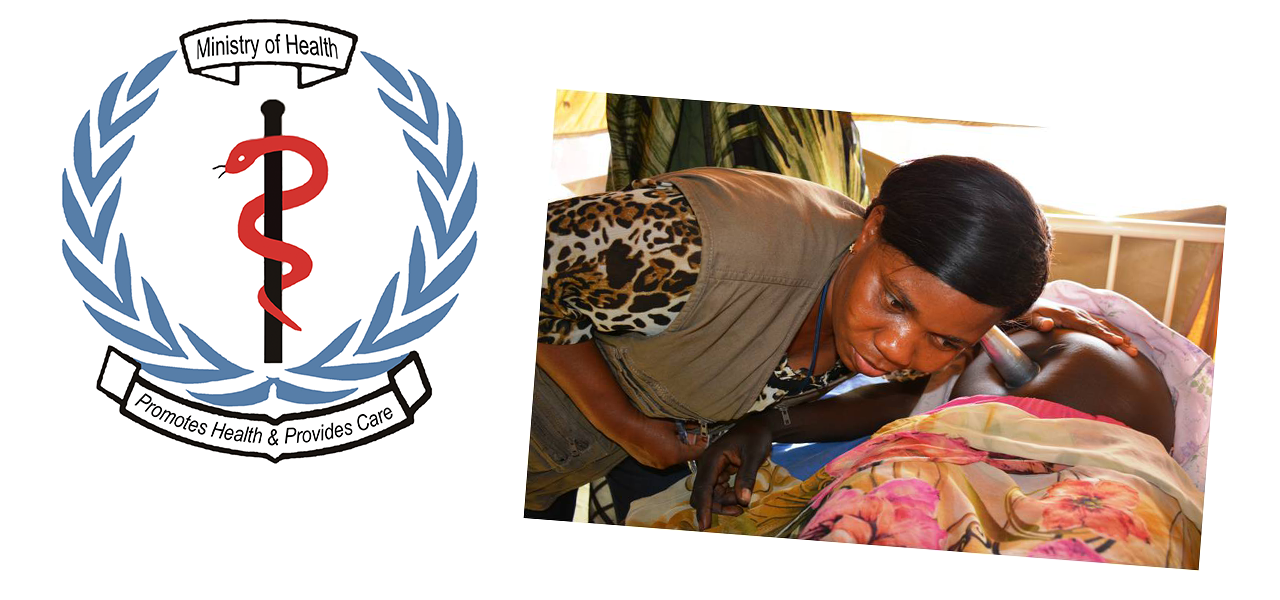
Saving Mothers and Babies
Deployment of UNV midwives
-
As the conflict escalates, United Nations Volunteer (UNV) midwives are deployed into humanitarian settings, including at Protection of Civilians Sites (POCs) managed by the UN for Internally Displaced Persons (IDPs). The UNV Midwives provide midwifery services, ensuring access to skilled birth attendants for IDPs. Training is also provided for midwives to work in humanitarian settings.
Association strengthening
-
SSNAMA develops the first Code of Conduct for Nurses and Midwives.
Regulation
-
Nurses and midwives in South Sudan participate in the Africa Regulatory Consortium, working on strengthening nursing and midwifery regulations in the country.
Education
-
The Minister of Health issues a decree for the upgrading of all Health Sciences Institutes (HSI), requiring only diploma programmes be implemented at HSIs. The Ministry of Health (MOH) will therefore no longer train enrolled midwives and nurses in the country. All HSIs will offer diploma programmes for nursing and midwifery.
-
Nurses and midwives from the MOH and SSNAMA participate in a twinning programme with the Zimbabwe Midwives Association, supported by UNFPA and ICM.
-
UNFPA supports 6 nurses and midwives to travel to Tanzania to be trained in health personnel education as tutors.
-
The MOH, with support from the World Bank, supports 11 nurses to be trained as nurse anesthetists in Kenya. After initial challenges, they graduate successfully and return to South Sudan.
-
14 midwives complete their studies in Uganda and are deployed in health facilities across South Sudan.
2015
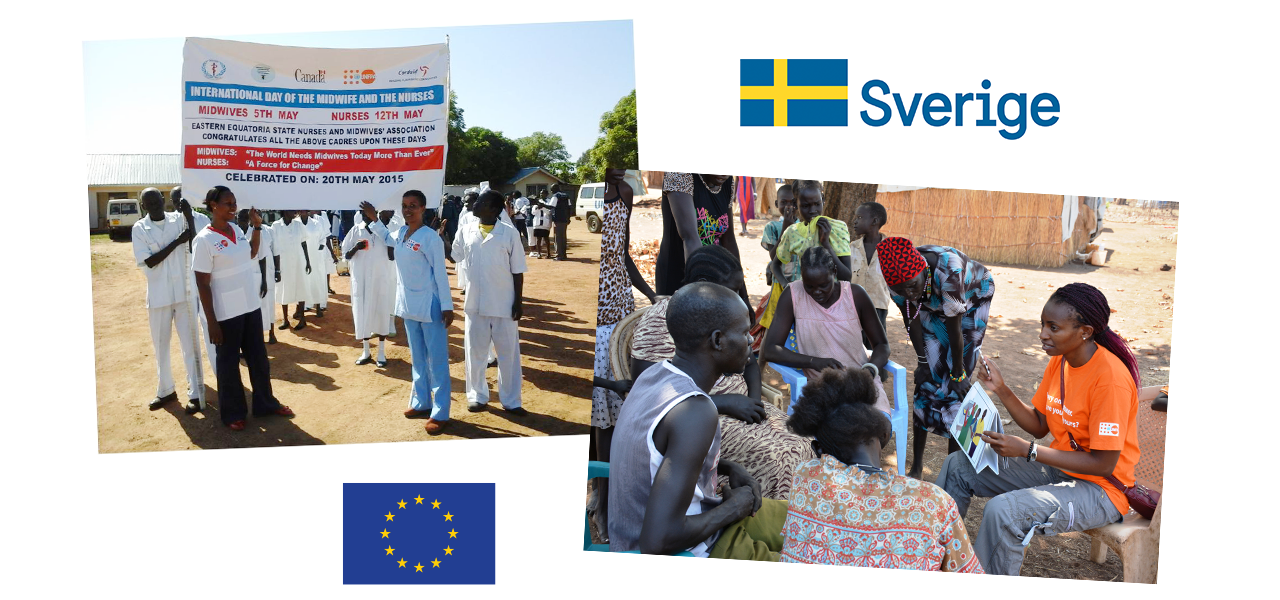
Continuing Progress
Education
-
Over 100 midwives and nurses are estimated to graduate from Juba College of Nursing and Midwifery (JOCNAM).
-
Nurses and midwives join other healthcare workers to participate in the Sweden course on sexual and reproductive health.
-
40 nurses, midwives and clinical officers are sent to study health personnel education in Tanzania to become tutors, with support from the European Union (EU).
-
For the first time, 15 National United Nations Volunteer (NUNV) midwives are deployed in the country, at the start of the peer‑to‑peer exchange programme with support from the Canadian Association of Midwives (CAM).
-
Two midwives successfully complete their studies in Uganda, receiving a diploma in midwifery from Jinja, and are deployed in South Sudan.
Association strengthening
-
International Day of the Midwife (May 5) and International Nurses Day (May 12) celebrations take place in over 10 locations across the country, with nurses and midwives marching, holding education sessions, and having speaking events.
-
President of the Canadian Association of Midwives (CAM) comes to South Sudan and visits Rumbek.
-
Midterm project evaluation is conducted for the Canada‑funded deployment of United Nations Volunteer midwives project.
-
Sweden signs agreement to jointly support the Strengthening Midwifery Services (SMS) II project.
-
UNFPA signs agreement with Global Affairs Canada for the SMS II project for 50 million CAD.
2016
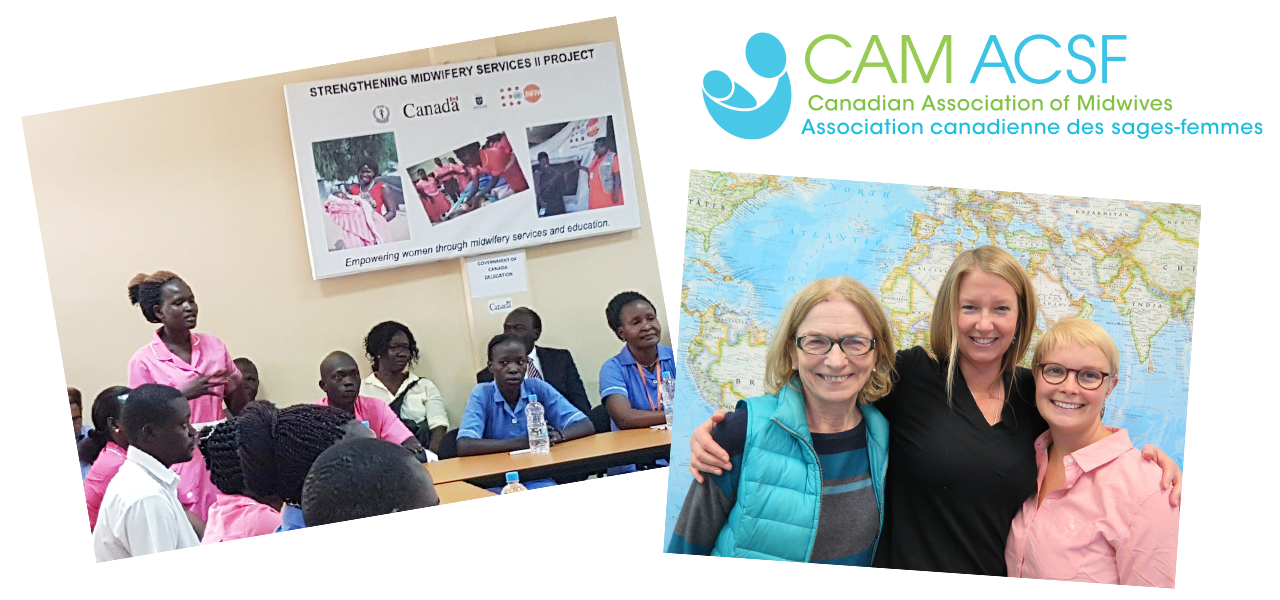
SSNAMA Finds a Home
SSNAMA office is established on the grounds of Juba Teaching Hospital
-
Resource room is created.
-
Laptops and other office items are procured.
Strengthening Midwifery Services in South Sudan, Phase 2
-
Canadian Association of Midwives (CAM) and SSNAMA begin working together on strengthening association activities.
-
The deploying midwives project concludes as a separate project and is integrated into the Strengthening Midwifery Services in South Sudan, Phase 2 (SMS II) project. As such, 16 of the international United Nations Volunteer (UNV) midwives conclude their assignments and 2 additional UNV midwives join the programme.
-
Full implementation of the SMS II project commences, including the Peer‑to‑Peer program, a twinning‑based mentorship model that matches in‑service midwives from SSNAMA with their counterparts from CAM.
Conflict
-
South Sudan experiences another internal conflict, causing displacement of persons and evacuation of international staff.
DOCUMENTS ...
2017
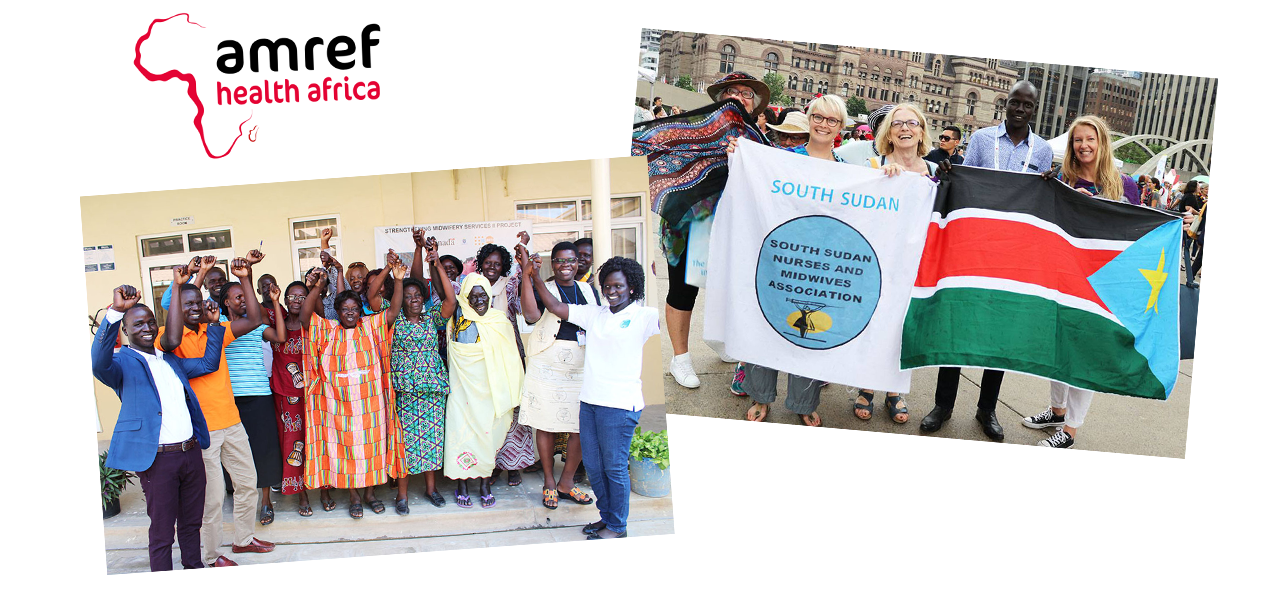
SSNAMA Gains Visibility
Association strengthening
-
AMREF provides core salaries and staff support, and gives support for capacity building of the Association, with the development of human resources and financial policies.
-
Full-time staff begin working at SSNAMA:
– Program manager and accounting departments begin
– Some resistance as neither are healthcare workers, but administrators
-
Second SSNAMA conference is held in Juba, with several international guests from ICM, ICN, ECSACON. Presidents of Kenya, Ethiopia and Uganda in attendance.
-
SSNAMA revises its constitution and reregisters the association under the new SS NGO Bill.
-
SSNAMA holds its first Annual General Meeting and elects office bearers. The new executive:
– Repent Khamis, Chairperson
– Agnes Juan, General Secretary
– Angela Louis, Treasurer
-
SSNAMA develops its first Strategic Plan with support from Canadian Association of Midwives (CAM).
Midwives travel to Canada
-
Mangwi Justine Juma, a National United Nations Volunteer (NUNV) midwife, delivers a speech to the Canadian Minister of Health and 70 parliamentarians at CAM‘s reception on Parliament Hill.
-
A team from SSNAMA, a UNV midwife, and the UNFPA participate in the ICM Conference and the IDM celebrations in Canada.
2018
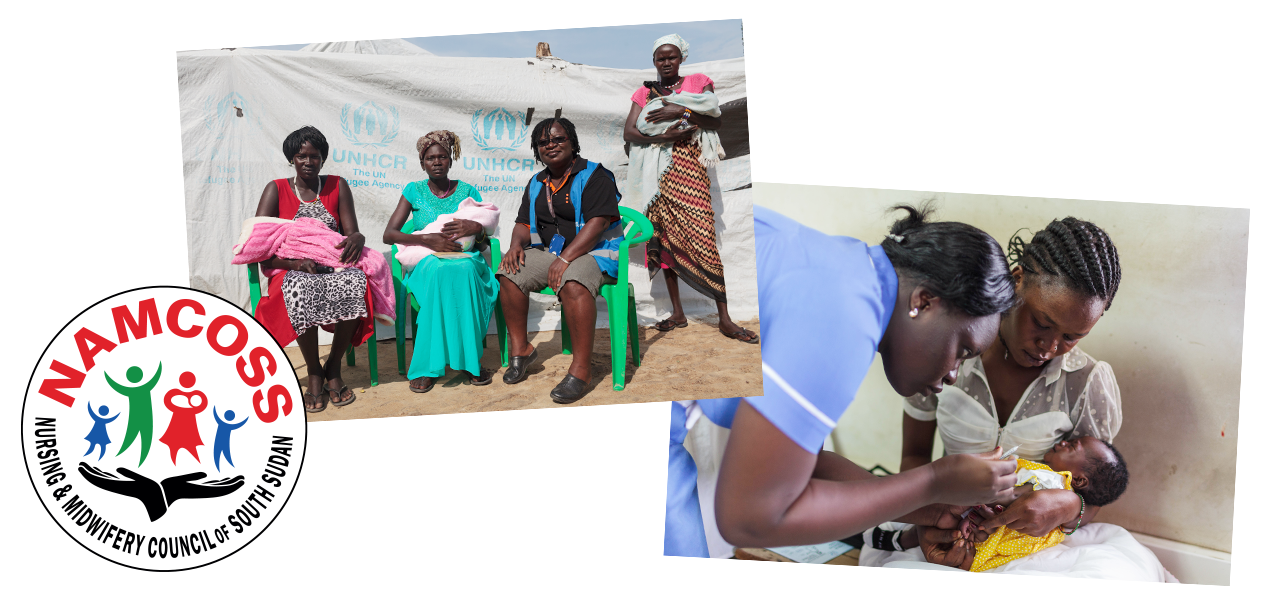
Lowering Maternal Mortality
Major inroads
-
Maternal mortality drops from over 2,000 to 789 per 100,000, with most maternal deaths occurring during labour, delivery and the immediate postpartum period. It is still the highest in the world, but the efforts of midwives and nurses in reducing maternal deaths has been astonishing.
Association strengthening
-
28 National United Nations Volunteer (NUNV) midwives are now serving in South Sudan, as 12 new NUNV midwives join the 16 already deployed in the country.
-
SSNAMA executive and members conduct a study tour with the Uganda Nurses and Midwives Association, and also participate in their conference.
Infection Prevention and Control (IPAC)
-
A 3‑day workshop in Juba outlining the importance, steps and actions to be taken by midwives, nurses and other healthcare providers to reduce the risk of infection among patients turns into an unforgettable experience for all involved.
My big dreams for the next couple of years are that things are going to change — because we have already seen great changes happening. Our country is still young. There are a lot of things that need to be done at once. Health is a priority, everything is a priority … in my position, I am able to see clearly what are the priorities.
— Agnes Juan, Secretary General, SSNAMA
Regulation
-
Ministry of Health (MOH) procures the services of a lawyer to review and rewrite the Nurses and Midwives Bill.
-
The Minister issues an order establishing the Nurses and Midwives Council of South Sudan (NAMCOSS) and interim regulations.
-
MOH launches the interim Nursing and Midwifery Council with representatives from select states, police services, faith‑based and NGO groups.
-
Nurses and Midwives Uniform Policy and Dress Code is finalized and approved.
2019
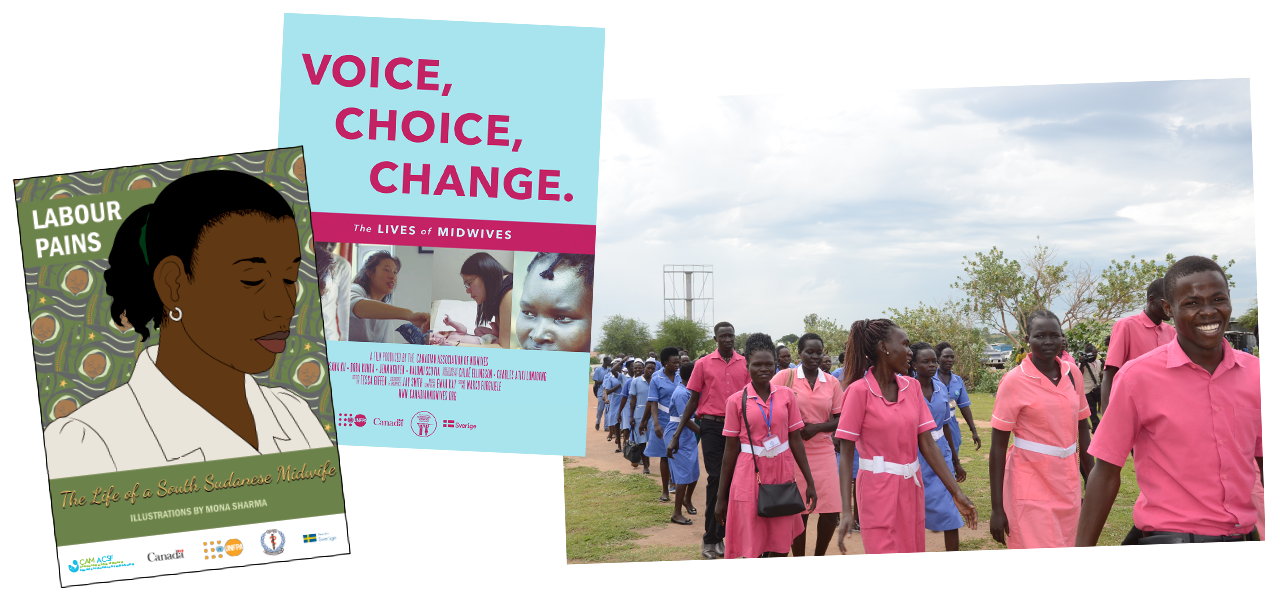
Positive Outcomes
Education
-
5 nurses and midwives receive a Masters in Nursing from Great Lakes University of Kisumu in Kenya.
-
9 nurses and midwives receive a Bachelors Degree in Midwifery and Nursing from Great Lakes University of Kisumu.
-
20 midwives and nurses commence the first Bachelor’s Degree programme in midwifery at the St. Mary’s Help College in Wau.
-
The first local training of nurses and midwives as tutors begins at the College of Physicians and Surgeons of South Sudan (CPS).
-
Over 24 Health Sciences Institutes (HSI) are established across the country, training nurses and midwives at diploma level.
Association strengthening
-
SSNAMA increases its branches to 15 across the country.
-
SSNAMA engages in business ventures at the state level with support from Canadian midwives (almost $5,000 CAD), with the goal of becoming financially independent from international donors. Through innovative business trainings delivered by Vocational Skill Development Organization (VOSDO), each SSNAMA chapter plans to open businesses designed to financially support the chapter.
Regulation
-
SSNAMA is confirmed as a full, unconditional member of ICM.
-
Ministry of Health finalizes the Second Nursing and Midwifery Strategy 2020‑2024.
Comic Books
-
SSNAMA and the Canadian Association of Midwives (CAM), as part of the SMS II project, launch the first instalment of Labour Pains, a projected three‑part series of comic books based on the real‑life experiences of midwives and student midwives in South Sudan.
-
The other instalments are launched in 2020.
Documentary film
-
A 30-minute film, VOICE, CHOICE, CHANGE: The Lives of Midwives, is released by SSNAMA in partnership with the UNFPA and Canadian Association of Midwives (CAM). It offers an intimate glimpse into the lives of four, very different, very complex women in South Sudan (NUNV midwives Dora Kunda and Scovia Nalumu) and in Canada (Jenn Nguyen, RM and Susanna Ku, RM).
2020
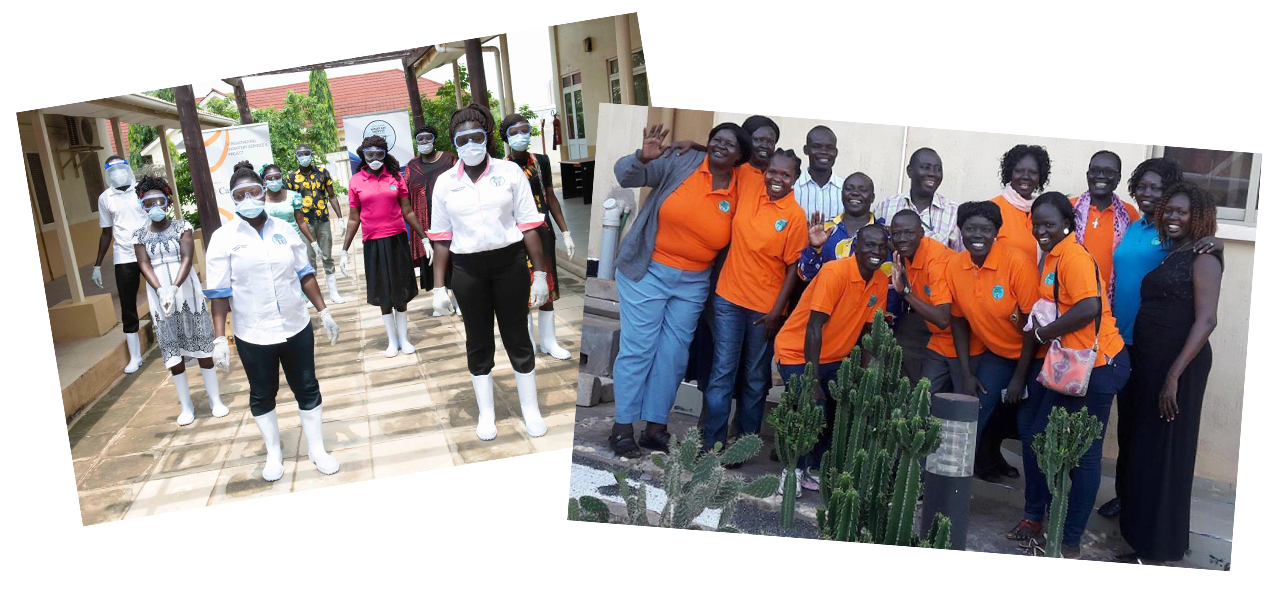
A Year of Unexpected Change
Peace
-
Peace is established in South Sudan as 2020 is declared Year of the Nurse and Midwife, but COVID‑19 takes centre stage and severely impacts the work of nurses and midwives.
PPE Uniforms
-
SSNAMA advocates for more PPE to be made available and delivered through a series of public engagement campaigns and videos on WhatsApp.
Education
-
SSNAMA members create workshops on adolescent health and sexuality. The young women in the class are all given “Dignity Kits” (menstrual hygiene kits), consisting of washable pads, a washcloth and soap. With it, girls can continue to go to school, even during their periods, instead of spending time sitting on ash, isolated from the public and missing valuable education time.
-
All educational facilities are interrupted for long stretches due to COVID‑19. The replenishment of new midwives and nurses is delayed. Some classes move online, but in areas where only 20% have internet access, virtual teaching is not really a viable option.
Regulation
-
SSNAMA celebrate their admittance to the International Council of Nurses.
To us, as an association, it is a big turn and we will use it for advocacy in a bigger way. Now we can proudly feel that we are members of the international nursing community. For the nurses, it will lift the profile of the nursing profession in the country, and we are so happy that this will provide us an opportunity to participate fully in the activities of ICN.
— Repent Khamis George, President, SSNAMA
Research and Statistics
-
The research activity, Assessing the Quality of Integrated Reproductive and Maternal Health Services at the SMSII‑Supported EmONC Centres, is undertaken by the Ministry of Health, with the financial support of the Government of Canada and the Government of Sweden through UNFPA.
-
The Integrated Reproductive and Maternal Health Services in South Sudan Research Report is created, along with a series of Health Facility Specific Quantitative Reports for 12 hospitals in South Sudan.
2021
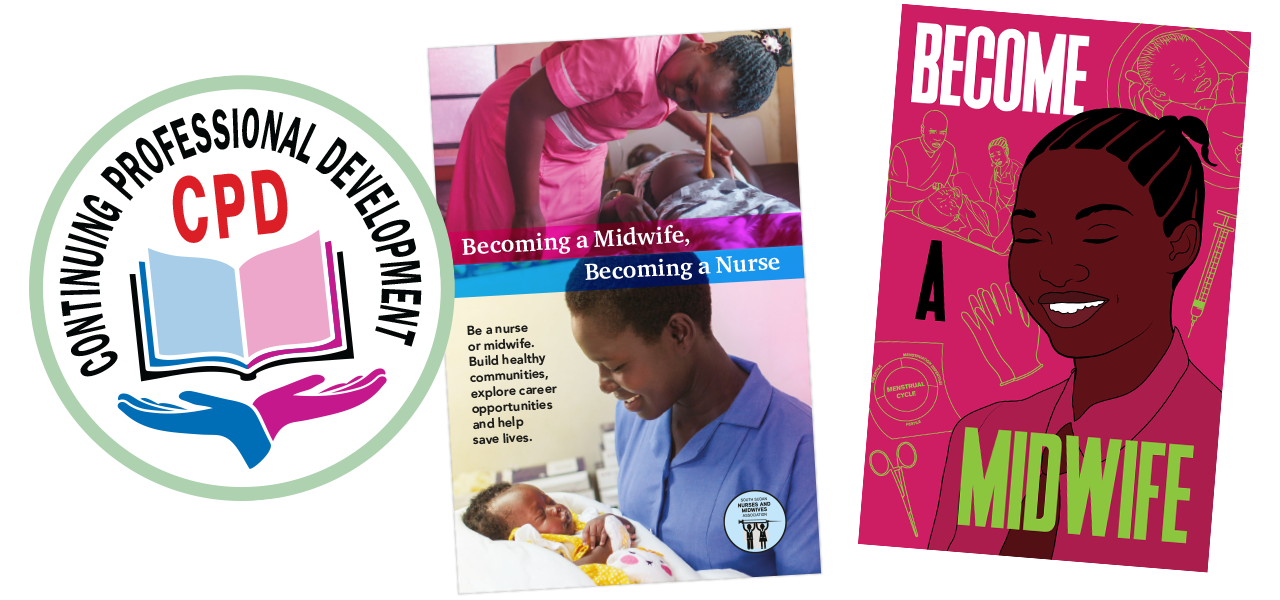
SSNAMA Firmly on the International Stage
Association strengthening
-
SSNAMA holds its third national conference, both physically and virtually.
-
SSNAMA holds its Annual General Meeting and elections. The National Chairperson is returned to serve another term of office.
Recruitment
-
Despite the setbacks caused by COVID‑19, SSNAMA continues to disseminate innovative recruitment materials to high school and college students. The materials promote the professions of midwifery and nursing as viable and valuable career paths.
Peer-to-Peer Mentorship Program concludes
-
The Peer-to-Peer Mentorship Program (2016‑21) comes to an end, and a photo expo about the project is created on the SSNAMA website.
NAMCOSS CPD Portal
-
Nurses and Midwives Council of South Sudan (NAMCOSS) creates a website and builds a Continuing Professional Development (CPD) Portal. It features links to learning resources to help midwives keep themselves up‑to‑date with the changes in research and clinical practice guidelines.
